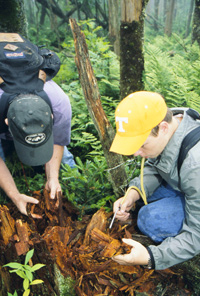|
Appalachian Highlands Science Journal, Issue 3, Now Available
The 16 page collection of articles focuses on scientific research resulting from the efforts of Natural Resource Challenge projects in the Appalachian Highlands Monitoring Network. This includes results from the Inventory and Monitoring team, the Exotic Plant Managment Team, the Southern Appalachian CESU (Cooperative Ecosystems Study Unit) and the Appalachian Highlands Science Learning Center.
.
To view Issue 1 of the journal, click here.
High School Intern Program Continues with Funds from Toyota and Friends of the Smokies
has awarded Friends of the Smokies a $1,000,000 grant to support science education programs in Great Smoky Mountains National Park. Part of these funds will be used to support hiring high school interns in the summer at various locations in Great Smoky Mountains National Park. Interns will assist University scientists and park staff with field research and education projects throughout the summer. If you are a high school student, age 16 or older, and are interested in these internships, please contact the Education Coordinator . Interns will have to live within commuting distance of the park since there is no housing available. For more information, view the .
Teacher Enrichment Seminars Continue with Funding from Toyota and Friends of the Smokies.
Part of the $1,000,000 science education grant from Toyota to the Smokies via Friends of the Smokies will be used to train teachers in inquiry-based teaching techniques. Workshops will be held throughout the Smokies in the next several years that will allow teachers to train from park professionals and research scientists. For a complete list of seminars this year, see our page.
Citizen Science Best Practices Manual Published
We are proud to announce that the "Directors Guide to Best Practices on Citizen Science" was recently published through the Association of Nature Center Administrators. This monograph is an outgrowth of a 2003 Citizen Science Forum held at the Great Smoky Mountains Institute at Tremont. It is a collective effort from a variety of citizen science program managers highlighting how to plan and impliment a citizen science program. The manual is available for $12 through the website.
| 










